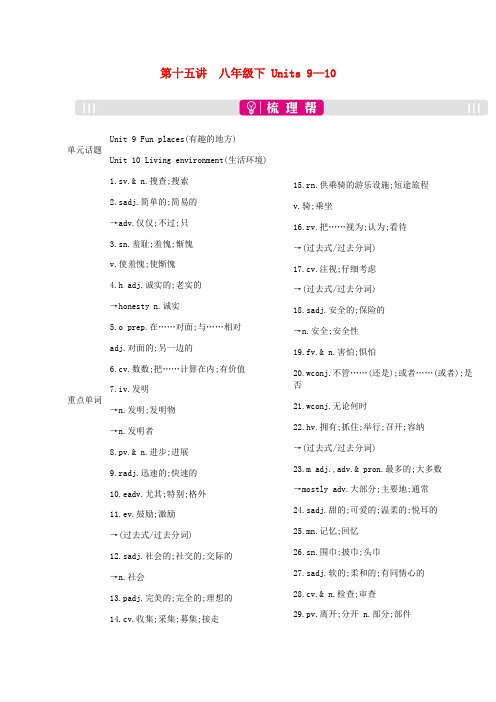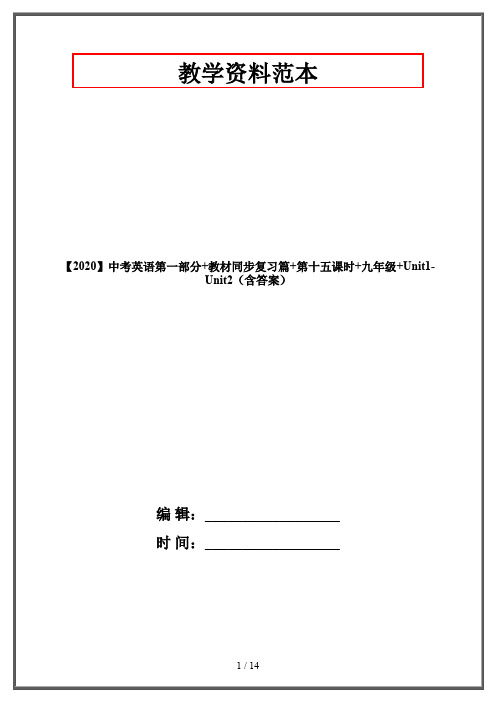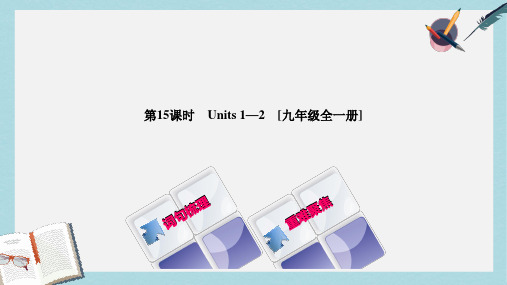2019-2020年中考英语 第一章 基础知识 第十五节 句子的种类检测复习
- 格式:doc
- 大小:22.50 KB
- 文档页数:3

2019-2020人教版九年级英语上册unit1 基础知识复习及训练基础知识整理:Unit 1 How can we become good learners?一.重点短语1. by doing sth 通过做某事2. ask sb. for help 请求某人的帮助3. be patient 耐心点儿4..improve one‟ s speaking skills 提髙某人说的能力5. read aloud 大声朗读6. spoken English=oral English英语口语7. have conversations with sb. 与某人交谈 8. listen to tapes 听磁带9. make word cards 制作单词卡10. make mistakes in grammar 犯语法错误11. make sentences with用.......造句12. the secret to language learning语言学习的诀窍13. be afraid to do sth./ of sth,不敢'做某事 14. fall in love with.. . 爱上(fell, fallen) 15. body language 肢体语言16. take notes 记笔记 (took, taken)17.learning habits 学习习惯18. have sth. in common 有...共同点19. pay attention to (doing )sth注意 (paid) 20. connect…with…把....与....联系起来21. write down key words 摘抄重点词22. in class 在课堂上 after class 课后23. be interested in…对.......感兴趣= take an interest in…24. do sth. on one’s own 独立做某事25. worry about=be worried about 为...而担忧26. depend on (doing) sth.依赖;取决于27. look up a word in a dictionary查字典28. be born with 天生具有29 repeat: say or do… again30. how to pronounce 怎样发音 pronunciation 发音 look for 寻找31. practice doing sth.练习做某事 keep doing sth. 一直做某事32. each other = one another 彼此,相互33. a part of... ... ...的一部分34. even if = even though 即使,虽然35. instead of (doing) sth 代替 35. bit by bit一点一点地,逐渐地36. the way of doing sth. (to do sth) 做某事的方法37. at once=right now立刻,马上38. so that 以便,为了=in order that+从句 in order (not) to do sth为了(不)做某事二.重点句型1. by的用法a. 介词 prep. (指交通等)乘;例:The man came by bus. 那人是坐公共汽车来的。

精品-2019届中考英语复习第一篇语言基础知识第15课九年级Units1_2基础知识第15课九年级 Units 1—2课前预热中考词汇拓展重点易错单词1. textbook 教科书2. conversation 对话;交谈3. aloud 出声地;大声地(读)4. sentence 句子5. patient 有耐心的;病人6. secret 秘密7. grammar 语法8. repeat 重复9. note 笔记10. physics 物理学11. chemistry 化学12. increase 增加13. speed 速度;加速14. born 出生15. create 创造(动词)16. attention 注意;关注(名词)17. connect 连接;与……有联系18. review 回顾;复习19. stranger 陌生人20. relative 亲戚21. pound 英镑22. dessert 甜点23. garden 花园24. admire 欣赏;仰慕25. treat 款待;请(客)26. novel 小说27. punish 处罚;惩罚28. warn 警告;告诫29. present 现在;礼物词汇拓1. pronounce(v.)→ pronunciation (n.)发音;读音2. patient(adj. & n.)→ patience (n.)13. lie(v.)→ lay (过去式)→ lain (过去分词)平躺;处于展耐心;毅力3. express(v.)→ expression (n.)表情;表示;表达方式4. discover(v.)→ discovery (n.)发现;发觉5. able(adj.)→ ability (n.)能力;才能6. create(v.)→ creative (adj.)有创造力的;创造性的7. active(adj.)→ actively (adv.)活跃地→ activity (n.)活动8. connect(v.)→ connection (n.)连接;与……有联系9. wise(adj.)→ wisely (adv.)明智地;聪明地10. strange(adj.)→ stranger (n.)陌生人11. steal(v.)→ stole (过去式)→ stolen (过去分词)偷;窃取12. lay(v.)→ laid (过去式/过去分词)放置;下蛋14. die(v.)→ death (n.)死;死亡→ dead (adj.)死的;失去生命的→ dying (现在分词)死;死去15. business(n.)→ businessman (n.)商人16. punish(v.)→ punishment (n.)处罚;惩罚17. warm(adj.)→ warmth (n.)温暖18. spread(v.)→ spread (过去式/过去分词)传播;展开;蔓延19. memory(n.)→ memorize (v.)记忆20. know(v.)→ knowledge (n.)知识21. loud(adj.)→ aloud (adv.)喧闹地;大声地;响亮地中考词组短语词组1. pay attention to注意2. lay out摆开;布置3. end up最终成为4. by asking the teacher for help通过向老师求助5. read aloud to practice pronunciation 大声朗读来练习发音6. improve one’s speaking skills提高某人说的技能7. too hard to understand spoken English太难而不能理解英语口语8. read word by word一个单词一个单词地读9. be patient with... 对……有耐心10. an English movie called... 一部名叫……的英文电影11. It’s a piece of cake. 小事一桩。

第15课时九年级Units 1~3好题随堂演练一、阅读理解(2018·山东滨州中考)Inventions make the world better, smarter and a little more fun.The folding bike helmet(头盔)People hate to wear a helmet because it's think and heavy. Morpher is a bike helmet made from plastics. It is just as strong as the traditional ones,but flexible(灵活的)enough to fold almost totally flat. Also it is much easier to carry.Shoes that tie themselvesAfter we see the movie Back to the Future,almost everyone wants a pair of selftying shoes. Now, thanks t o Nike, the shoe dream comes true. When you press a button, the shoes can tie themselves.The smart alarm clock—Hello SenseAn alarm clock, call Hello Sense, can improve your sleep. It can control the temperature, light and even air quality in your bedroom to help you have a perfect sleep environment. And it can record your sleep cycles.Sweet potatoes tht could save livesThe lack(缺乏) of vitamin A can cause blindness and many other illnesses for illnesses. In subSaharan Africa, plant experts are helping them grow a kind of new sweetpotatoes. These potatoes can help them fight against someillnesses.1.The folding bike helmet is .A.thick and heavyB.made from metalC.not as strong as a traditional oneD.flexible enough to fold almost flat2.Which company makes selftying shoes?A.Adidas. B.Kappa. C.Nike. D.LiNing.3.The sm art alarm clock can NOT .A.improve our sleepB.control our weightC.record our sleep cyclesD.control the temperature in the bedroom4.If a child has a poor eyesight, he may be in the lack ofA.vitamin A B.vitamin B C.vitamin C D.vitamin C5.You can find the passage in a .A.newspaper B.story book C.guide book D.cookery book二、单词拼写与运用A.根据句意及汉语提示或音标填写单词。



课后练习15 九年级 Units 1—2一、完形填空(30分)(2018·湖州市吴兴区模拟)One day a young man called Gary went to see a wise old man. He wanted to now why he wasn’t able to reach all of his 1 in his life.He found the old man reading in a small house by the river. With a smile, the wise man listened to Gary’s story and told him, “First come to help me2 a ettle (水壶) of water!”Gary saw a big ettle standing in the corner net to a small stove(火炉), but he didn’t find any 3 . So he went out to search for some.He came bac with some dry wood, 4 the ettle with water and put it on the stove. Then he put some wood in the stove and 5 a fire. But because the ettle was too 6 , when the wood burned up, the water did not boil. So he ran off to get more.When he returned, the water had turned 7 . This time he learned his lesson and prepared more wood in advance. Then the water boiled very 8 .“If there is not enough wood, 9 would you boil the water?” the wise man ased.Gary thought for a moment but didn’t now the 10 , so he shoo his head.“Well, then just pour out some water 11 the ettle!” the old man said.Gary 12 thoughtfully.“ 13 , you set too many goals,” said the old man. “It’s 14 lie the large ettle full of water. You didn’t have 15 wood, so you couldn’t boil the water. If you want to mae the water boil, then you will have to either pour some out or prepare more wood!”()1. A. stories B. tass C. goals D. dreams()2. A. bring B. drin C. find D. boil()3. A. wood B. stone C. food D. fruit()4. A. put on B. filled up C. too away D. piced up ()5. A. saved B. ept C. started D. changed()6. A. new B. light C. heavy D. large ()7. A. cold B. bad C. red D. hot()8. A. slowly B. quicly C. carefully D. quietly()9. A. when B. where C. how D. why()10. A. reason B. question C. lesson D. answer()11. A. into B. from C. with D. by()12. A. waved B. nodded C. shoo D. signed()13. A. At first B. Once again C. For eample D. At least ()14. A. still B. just C. even D. never()15. A. dry B. fresh C. big D. enough二、阅读理解(16分)(2017·天台模拟)When you enter my home for the first time, you will always be impressed with a small white envelope(信封). No name, no address. It has hung on our tree for about 10 years.It was all because my husband, Mie, hated Christ-mas. He didn’t hate the true meaning of Christmas, but the commercial(商业的) way of it spending too much on the usual Christmas gifts, such as rushing into a store to get a tie for Uncle Harry.nowing he felt this way, I decided not to buy the usual gifts. I reached for something special for Mie. The idea came in an unusual way.Our son evin, 12, was wrestling at school. Before Christmas, there was a match against a team helped by a city church. As the match began, I was surprised to see that the other team was wrestling only in old clothes because they could not afford the wrestling uniforms, while our boys in their blue and gold uniforms. Of course we ended up beating them.Mie shoo his head sadly, “I wish just one of them could have won,” he said. “In fact, they could if they wear the uniforms. They have talent for wrestling, but losing lie this could tae the heart right out of them.”Mie loved ids—all ids—and he new them, having trained the ids in football and baseball. At that time, I thought of the idea for the gift. That afternoon, I went to a store and bought some wrestling uniforms and sent them to the city church for the ids without leaving my name.On Christmas Eve, I put the envelope on the tree, the note inside telling Mie what I had done and telling him that this was his gift from me. His smile was the brightest thing about Christmas that year and the following years.You s ee, we’ve lost Mie now. But every Christmas Eve I would put an envelope on the tree, and in the morning, three more joined it. Each of our children had secretly put an envelope on the tree for their dad.Mie’s spirit, lie the Christmas spirit, will always be with us.()1. Mie hated Christmas because he__________.A. dislied receiving the same gifts every yearB. didn’t lie people spending too much money on giftsC. hated rushing into a store to buy a tie for Uncle HarryD. didn’t understand the true meaning of Christmas()2. We can infer(推断) from the passage that the writer is a(n)__________ .A. brave and outgoing manB. loving and patient manC. understanding and ind womanD. strict and serious woman()3. The underlined sentence in Paragraph 5 means__________.A. they didn’t have talent because they lost the matchB. they might lose heart after they were badly beaten in this wayC. they won’t accept the result because of the old clothesD. they tried to cheer themselves up even if they failed in the match()4. It can be learned from the passage that.A. the writer sends uniforms to children every ChristmasB. the children now prefer new toys to the envelopeC. the white envelope was a gift from the poor idsD. Mie’s spirit will have a strong influence on his children forever三、词汇运用(15分)A)用方框中所给词的适当形式填空,每词限用一次。
第15课九年级 Units 1—2课前预热中考词汇拓展中考词组短语中考句型回顾课堂突破中考重点单词与短语一、treat的用法【例句展示】1. Parents take their children around the neighborhood to ask for treats. 父母带着他们的孩子到附近街坊去要求款待。
2. This is my treat.这次由我请客。
3. She treated us to some delicious chicken.她请我们吃了些美味的鸡肉。
4. Don’t treat me as a child.别把我当作孩子对待。
【精讲辨析】1. treat在例1中用作可数名词,意为“请客;款待”。
2. treat用作及物动词,其意义和用法如下:(1)意为“款待;请客”。
常构成短语treat sb. to sth.,意为“请某人吃……”。
(2)意为“看待;当作”,与as连用构成treat...as...短语,意为“把……当作……”。
(3)意为“治疗”。
【活学活用】用treat的适当形式填空。
The teacher always__________ his students as his own children.二、by的用法【例句展示】1. I try to pass the test by working hard.我努力学习以尽力通过考试。
2. I must finish the work by 12 o’clock.我必须在十二点之前完成工作。
3. I walked by Lily’s house yesterday.昨天我从莉莉家经过。
4. She often walks by the river.她经常在河边散步。
5. The bedroom was cleaned by me.我打扫过卧室了。
【精讲辨析】by是介词,有多种意思和用法:1. by表示方式、方法、手段,意为“通过/用/靠……(而达到某种预期的目的)”,后接名词或动名词短语,在句中作方式状语,可放在句首也可放在句尾。
第15课九年级Units 1—2自我检测(一)一、易错单词1. 教科书2. 对话;交谈3. 出声地;大声地(读)4. 句子5. 有耐心的;病人6. 秘密7. 语法8. 重复9. 笔记10. 物理学11. 化学12. 增加13. 速度;加速14. 出生15. 创造(动词)16. 注意;关注(名词)17. 连接;与……有联系18. 回顾;复习19. 陌生人20. 亲戚21. 英镑22. 甜点23. 花园24. 欣赏;仰慕25. 款待;请(客)26. 小说27. 处罚;惩罚28. 警告;告诫29. 现在;礼物二、词汇拓展1. pronounce(v.)→(n.)发音;读音2. patient(adj. & n.)→(n.)耐心;毅力3. epress(v.)→(n.)表情;表示;表达方式4. discover(v.)→(n.)发现;发觉5. able(adj.)→(n.)能力;才能6. create(v.)→(adj.)有创造力的;创造性的7. active(adj.)→(adv.)活跃地→(n.)活动8. connect(v.)→(n.)连接;与……有联系9. wise(adj.)→(adv.)明智地;聪明地10. strange(adj.)→(n.)陌生人11. steal(v.)→(过去式)→(过去分词)偷;窃取12. lay(v.)→(过去式/过去分词)放置;下蛋13. lie(v.)→(过去式)→(过去分词)平躺;处于14. die(v.)→(n.)死;死亡→(adj.)死的;失去生命的→(现在分词)死;死去15. business(n.)→(n.)商人16. punish(v.)→(n.)处罚;惩罚17. warm(adj.)→(n.)温暖18. spread(v.)→(过去式/过去分词)传播;展开;蔓延19. memory(n.)→(v.)记忆20. now(v.)→(n.)知识21. loud(adj.)→(adv.)喧闹地;大声地;响亮地自我检测(二)一、词组短语1. 注意2. 摆开;布置3. 最终成为4. 通过向老师求助5. 大声朗读练习发音6. 提高某人说的技能7. 太难而不能理解英语口语8. 一个单词一个单词地读9. 对……有耐心10. 一部名叫……的英文电影11. 小事一桩。
2019-2020年中考英语第一章基础知识第十五节句子的种类检
测复习
( )1.(2013年安徽,40)—Tony, ________ are you in such a hurry?
—The meeting will start soon.I don't want to be late.
A.where B.how C.when D.why
( )2.(2013年北京,29)—________ do you go to the cinema?
—Once a month.
A.How long B.How far C.How often D.How much
( )3.(2013年毕节,24)—________ is your father?
—He is fine.Thank you!
A.Where B.Who C.How D.What
( )4.(2013年孝感,26)—________ have you been married?
—For twenty years.
A.How far B.How often C.How long D.How soon
( )5.(2013年苏州,11)—________ a beautiful car! I've never seen it before.
A.What B.Which C.How D.Whether
( )6.(2013年铜仁,34)—________ do you go to the library?
—Twice a week.
A.How soon B.How much C.How often D.How far
( )7.(2013年柳州,43)—Becky doesn't talk much, ________ she?
—Yes, she does.
A.will B.did C.does
()8.(2013年广东,38)Mo Yan won the Nobel Prize for Literature last year.________ excellent he is!
A.How B.What C.What a D.What an
( )9.(2014年广东,38)—Do you know Wang Feng? He can remember 100 groups of numbers in five minutes.
—Yes.________ man he is!
A.What a smart B.How smart C.What a stupid D.How stupid
( )10.(2014年广州,21)—Sorry I'm late.
—________ tell me the bus broke down again!
A.Never to B.Not C.Don't D.No
( )1.—It's reported that the 29th Olympic torch (奥运火炬) traveled to 135 cities around the world.
—________ exciting the news is!
A.What B.How C.What an D.How a
( )2.Don't ________ too much TV.It's bad for your eyes.
A.watch B.watched C.watching D.to watch
( )3.—________ enjoyable it is to travel by air!
—________.
A.How; So is it B.How; So it is
C.What; So is it D.What; So it is
( )4.________ weather it is!
A.What a fine B.How fine C.What fine D.How fine the
( )5.________ exciting match it is between Wang Liqin and Ma Lin in the 49th World Table Tennis Championships!
A.How B.What C.What a D.What an
( )6.Few of them hurt themselves in the earthquake last year, ________?A.don't they B.didn't they C.did they D.do they
( )7.I don't think he is right, ________?
A.isn't he B.is he C.do I D.don't I
( )8.—I won't go there with you tomorrow.
—________?
A.What about B.How C.Why not D.Where
( )9.—I usually have milk and bread for breakfast.
—________.
A.So do I B.So I do C.So do you D.I have so
( )10.________ up early to do exercise every day and you will become healthy. A.Getting B.To get C.Get D.Gets
( )11.—Don't forget to bring your book to school.
—________.
A.No, I won't B.OK, I will C.Yes, I won't D.Yes, I do
( )12.Let's go to the cinema to see a film, ________?
A.will you B.shall we C.won't you D.don't you
( )13.—Are you going to buy a book?
—________.
A.A book B.Yes, a book
C.Yes, I am D.No, I don't
( )14.________ is the population of the USA?
A.How much B.How many C.What D.How long
( )15.________ he runs!
A.What quick B.How quick
C.How quickly D.What quickly
第十五节句子的种类
真题·体验感悟
1—5 DCCCA 6—10 CCAAC
演练·巩固提升
1—5 BABCD 6—10 CBCAC 11—15 ABCCC。